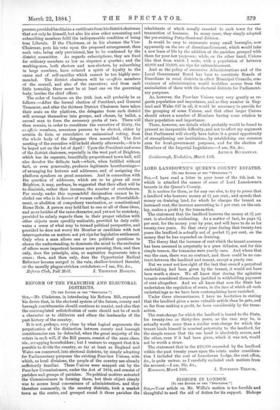LORD LANSDOWNE'S QUEEN'S COUNTY ESTATES.
[To THE EDITOR OP THE "SPECTATOR.)
have read a letter in your issue of the 8th inst. to which is attached the names of some of Lord Lansdowne's tenants in the Queen's County.
It is useless for them, or for any one else, to try to prove that a landlord who borrows money at 61 per cent., and spends that money on draining land, for which he charges the tenant an increased rent, the increase amounting to 5 per cent, on the out- lay, makes a profit by the transaction.
The statement that the landlord borrows the money at 31 per cent. is absolutely misleading. As a matter of fact, he pays 6i per cent. for the money year by year, and will have to do so for twenty-two years. So that every year during that twenty-two years the landlord is actually out of pocket 11 per cent, on the money that he has expended on draining.
The theory that the increase of rent which the tenant assumes has been assumed in perpetuity is a pure delusion, and for this simple reason, the tenancies were yearly ones. And where that was the case, there was no contract, and there could be no con- tract between the landlord and tenant, except a yearly one.
But we must not lose sight of the fact that even if a perpetual undertaking had been given by the tenant, it would not have been worth a straw. We all know that during the agitation tenants considered themselves justified in withholding payment of rent altogether. And we all know that now the State has undertaken the regulation of rents, in the face of which all such undertakings as we have been contemplating have vanished.
Under these circumstances, I have no hesitation in stating that the landlord gives a more valuable article than he gets, and so far from making a profit., be loses considerably by the trans- action.
The rent-charge for which the landlord is bound to the State, for twenty-two or thirty-five years, as the case may be, is actually worth more than a similar rent-charge for which the tenant binds himself in nominal perpetuity to the landlord, for the simple reason that the one bond is absolutely secure, and the other, even if it had been given, which it was not, would not be worth a straw.
The statement that in the £20,300 expended by the landlord within the past twenty years upon the estate under considera- tion I included the cost of Lansdowne Lodge, the rent office, Sr.c., is quite untrue, as I carefully excluded such matters from the account.—I am, Sir, Sce.,


































 Previous page
Previous page